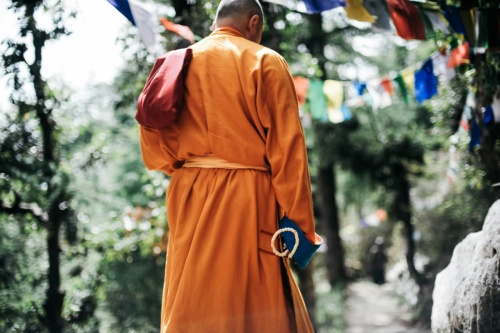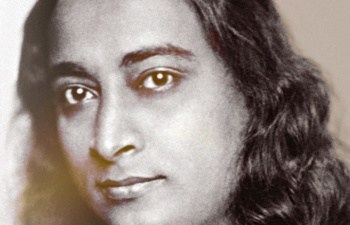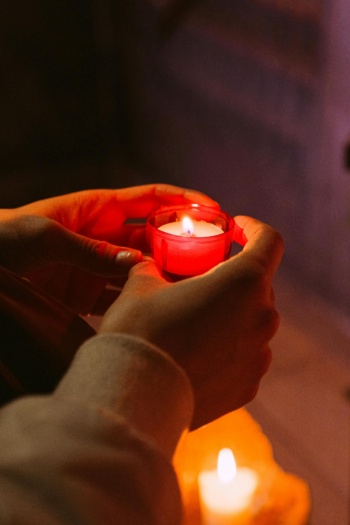Some time ago, I read a quote by Ram Das, a disciple of Neem Karoli Baba. He said in a very poetic way, “Just the way when we go in a forest and we appreciate different trees and different shrubs and different bushes, and we don’t go and discriminate between each one of them, deciding which one is better or worse. We just enjoy the experience of the jungle.” He said, “I try to bring that into my practice with people. I try to convert people into trees or shrubs and bushes.” He said that is his practice to bring the acceptance of people for what they are.
It’s not difficult to actually imagine people like this. Sometimes they are like rose flowers, very beautiful, with a wonderful fragrance. In their presence, we feel that fragrance. It is also not very difficult to experience people like a thorny bush, which no matter where you touch, it is going to prick you somewhere or the other. People can be any kind of tree. But we may find it difficult to accept it when they prick at times. We may find it easy to accept them if they give us fragrance.
A significant hurdle in acceptance, especially when we see terrible things happening around, is that we can’t accept those actions. But the moment we fall into the trap of judging people for their actions and then putting a label on them, we make a great mistake.
A very renowned monk, earlier in his life was trying to help with refugees in a war-torn country. At times when the ship was approaching with the refugees, the pirates would try to attack the ship. Sometimes refugees would escape, but sometimes the pirates would succeed. One of these times, when he was expecting a big ship with a lot of innocent men, women, and children, the pirates attacked that ship and many lost their lives. He was not able to save many. He was very distressed.
 That night, when he finally fell asleep, he had a dream. In that dream, he saw himself as a very small child, born in a very poor village in a very poor family – they didn’t have any food to eat, let alone any feast. Every day was a struggle. He didn’t see his parents around, so he had to fend for himself. Sometimes he got some food, sometimes he fell asleep hungry.
That night, when he finally fell asleep, he had a dream. In that dream, he saw himself as a very small child, born in a very poor village in a very poor family – they didn’t have any food to eat, let alone any feast. Every day was a struggle. He didn’t see his parents around, so he had to fend for himself. Sometimes he got some food, sometimes he fell asleep hungry.
As he grew up, he got together with his friends, and one day one of them suggested they could steal from a shop in the night. One barrel of food would take care of their hunger for an entire month. He liked that idea so much because he had never seen so much food in his life. They went and were successful.
But after one month, the same problem started again. The next time the same group of friends thought about a ship, where there was not one but 100 barrels on it. When they reached there, there was security, and they got into a fight. As he was just about to use his knife on someone, the monk woke up.
He realized he had just gone through the same process that these pirates probably went through all their lives. And in that moment, what shifted inside him was very transformative. It’s not that he justified their actions, but he realized where they were coming from. In that acceptance, he realized they were doing what they felt could bring them happiness. And he had to do what he felt was most right.
This is the spirit of true acceptance. We look not just at the action, but the story behind the action. What is the root of this ignorance? The moment we see it, we don’t hold it against the people. There is an evolution of consciousness we are part of.
Aren’t we all ignorant at some point? Don’t we all fall prey to delusion? Just because someone now is falling to a delusion that we are not falling for anymore; it is a very grave mistake to put them in a category of stupid actions. That is the ignorance we fall for. The moment we categorize people, we lose the opportunity to have compassion for them.
Whenever we see ignorance and feel, “Oh, why is it there?” it’s a recognition that we have been there. Master said the only reason we don’t want to steal people’s money now, is that we probably stole it earlier and realized it doesn’t work. When we come from that space, we don’t blame people for the actions they are doing. They just don’t know it yet.
The good news and inevitability are that one day they will know, and that’s the evolution of consciousness. So, we accept what they are, participate to the extent we feel called for, and move on.
The second problem with accepting people is when we get caught up in our own ideas. I remember, it was one of the first times that I went outside Ananda Center to share the teachings. With the same enthusiasm, I gave a talk about how important it is to observe Yamas and Niyamas. You shouldn’t be violent to anybody, no matter what they do to you. To my astonishment, one person questioned, “Are you out of your mind? If someone comes and does a mean thing to me, you say do nothing?” I was trying my best to convince them how we are all one and giving all these examples, but they were not listening.
In time, I realized it’s not about their readiness or my readiness. I was force-feeding them. They were a fine lot and were sincerely looking into freedom. Just that this is not an expression they’re interested in. Why didn’t I accept it? Why was it that my expression was the only way to find God?
My truth, we’re so attached to our version of it, so much so that we become protective of it. If we’re not aware, we might consider this is the only way. We could certainly try to share it with our family, with our friends. There is certainly some goodness in it. We may offer it up to them, “This is very beautiful. Please experience it.” But if they say no, we have to be watchful.
It’s not that they don’t want it. Maybe they want to do it in a different way. In the end, we have found a way to water the seeds within our consciousness by doing Kriya Yoga, by doing the practices that our Master has given us. If somebody says their sadhana is different and if they’re sincere about it, they will also touch the truth. We have to allow that possibility.
Every time we find ourselves in a ceaseless conflict, we have to be aware that this means we are stuck to a version of truth which isn’t final. It could be my truth. It could be working for me. It is not theirs. And it is not ultimate. Thus, we allow the other person the possibility to live their truth, and we both can happily coexist.
And now the last part – One of the biggest mistakes we make is when somebody comes and says a mean thing to us, or for that matter, somebody comes and does a good thing to us. We box people by their behavior.
Within ourselves, we have experienced so many different energies. Can we say that we, at times, also feel very angry and upset about things? We are a thorny bush at times. But don’t we also experience loving kindness at times? We hold onto the memory of previous experiences. And that blocks our way to acceptance. Even the person who was angry, the next day comes and says, “I’m so sorry, there was anger inside me, it’s gone now, I’m better, please accept me.” We say, “No, no.”
 There’s a very beautiful chant of Master’s, “I am but an empty vessel.” We are all empty vessels. This empty vessel is channeling different energies at different times.
There’s a very beautiful chant of Master’s, “I am but an empty vessel.” We are all empty vessels. This empty vessel is channeling different energies at different times.
As practitioners of this path, as Sadhakas, we consciously allow only good things to flow. We try to increase that goodness of the flow so that the good seeds get water, and the other habit patterns, the bad things, do not get water easily. But sometimes they will.
If it is true with us, same is true with others as well. If we don’t hold on to such experiences, when we look at that person also as a vessel, may be that we witnessed the moment when something good or terrible went through this vessel. But now I look at it again from the perspective of it being a fresh empty vessel.
We create a possibility, allowing the person not to be a fixed, rigid identity. Our body is changing. We have witnessed it. We have experienced something within this vessel; it always fluctuates, always changes, it’s always moving. When we look from that perspective, we allow healing. When we see the other person as also a vessel, we let go.
We don’t need to forget the incident. But we could acknowledge that what flowed through that person is gone. What I’m looking at now is just a vessel of Divine Mother. So, when we say “I accept,” this is the final level of acceptance.
If we remember this as one of the first thoughts when we look at the other person, especially the ones we are trying to accept with all the difficult things they bring. There’s a possibility the same difficult energy may flow from it, but I still allow the possibility that something else also can flow through it.
 With that, we can pause and close our eyes for a moment as we acknowledge that we are all channels of the Divine, the vessels of the Divine. Let’s invite the Divine to flow through all of us at this moment.
With that, we can pause and close our eyes for a moment as we acknowledge that we are all channels of the Divine, the vessels of the Divine. Let’s invite the Divine to flow through all of us at this moment.
And let everyone who is in need feels this upsurge, feels this energy through their individual experience. Allow them to experience the clarity, the healing that they all seek.
Taken from a talk by Acharya Amit. You can see the whole talk here https://youtu.be/EK4zLO8kkkQ?si=Den7gMBGm3WtdRy2
One Comment
Well written. It’s just what I need to hear today. Thank you for sharing. 🌸🦋🙏